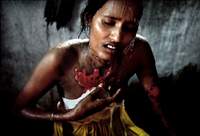Bangladeshi men pledge to fight acid attacks against women
Bangladeshi men pledged to fight against acid attacks - a vicious crime whose victims are mostly women and perpetrators usually men - to mark this year's International Women's Day, which falls Thursday.

Celebrities, sportsmen, schoolboys and some acid victims gave speeches, sang or told their stories as they lit candles at an event Wednesday, demanding proper enforcement of laws against the attacks.
Some wore T-shirts with slogans like "Real men don't throw acid."
The attacks most often involve flesh-burning acid thrown onto young women's faces or bodies by spurned suitors or angry husbands, according to the Acid Survivors Foundation.
The assaults disfigure, maim or kill dozens of people a year in poverty-ridden Bangladesh. The acid is usually obtained from battery shops, hardware stores, jewelry makers or weavers.
"We hope that not one more face gets burnt by acid ever again," said the Acid Survivors Foundation's executive director, Monira Rahman. The group organized the men's gathering Wednesday at an auditorium in the country's capital, Dhaka.
"Most attackers of this hateful and cowardly crime are men, but most men are against it," said Showket Hossain, a member of the Foundation's board of trustees.
However, more children and men are becoming acid attack victims, often over family or property disputes.
"We men have to stop it," Bidhan Chandra, a young man who was attacked with acid over a land dispute, said in a choked voice.
Chandra, a dance instructor from southern Bangladesh, had to give up his profession and now runs a small business.
Acid attacks have declined slightly since Bangladesh introduced stringent laws in 2002, with the maximum penalty of death for fatal acid attacks and stricter regulation of acid sales.
There were 204 known victims in 2006, down from 270 in 2005 and 325 in 2004, according to the foundation's web site.
But the foundation says trials or prosecution have been few, and implementation of the laws is often weak, the AP reports.
"About 90 percent of cases don't come to trial for lack of witnesses," Hossain said.
Bangladesh's leaders, meanwhile, marked International Women's Day by vowing to not to spare abusers of women and children.
President Iajuddin Ahmed said overall national development was only possible by involving women in socio-economic activities and ensuring their rights at family, social and state levels.
Bangladesh's constitution guarantees equal rights for women. The Muslim-majority nation has been ruled by women prime ministers over the past 15 years, and female workers are a majority in the readymade garments industry, the country's main export earner.
But women still suffer from high levels of violence, and poor levels of health, nutrition and education in traditional communities, rights groups say.
Subscribe to Pravda.Ru Telegram channel, Facebook, RSS!


